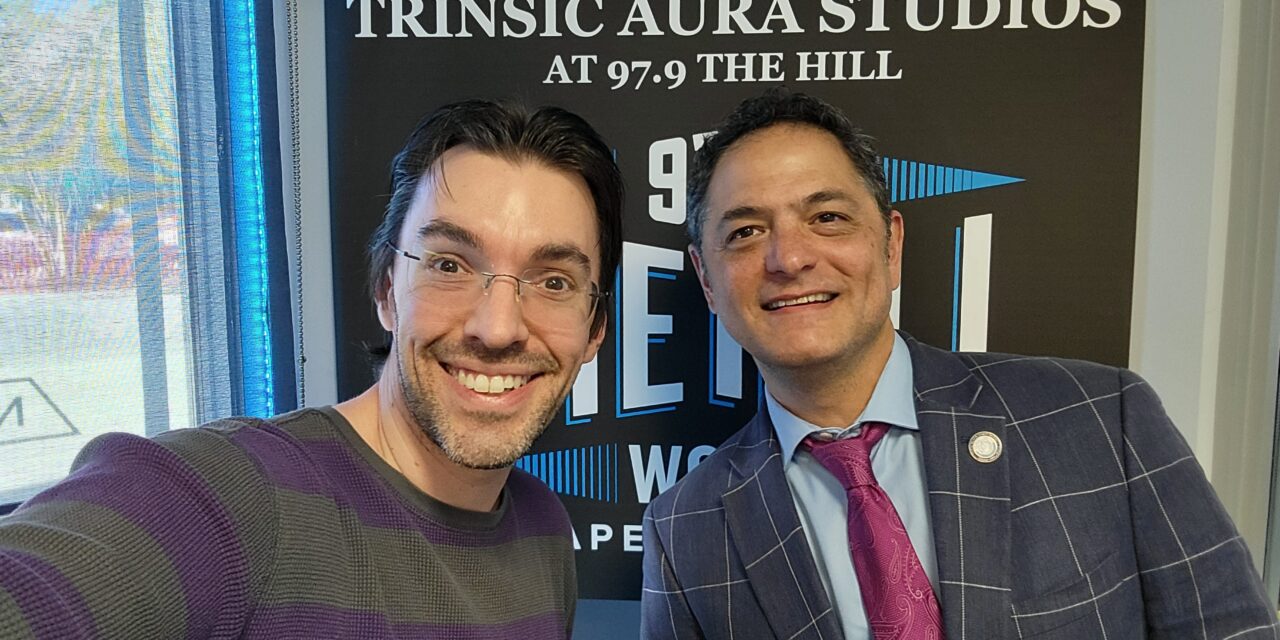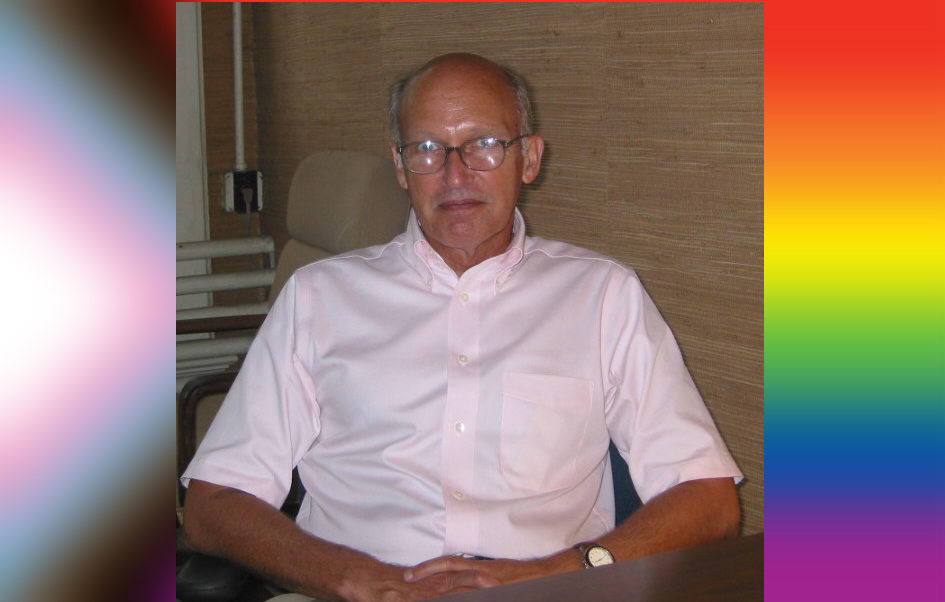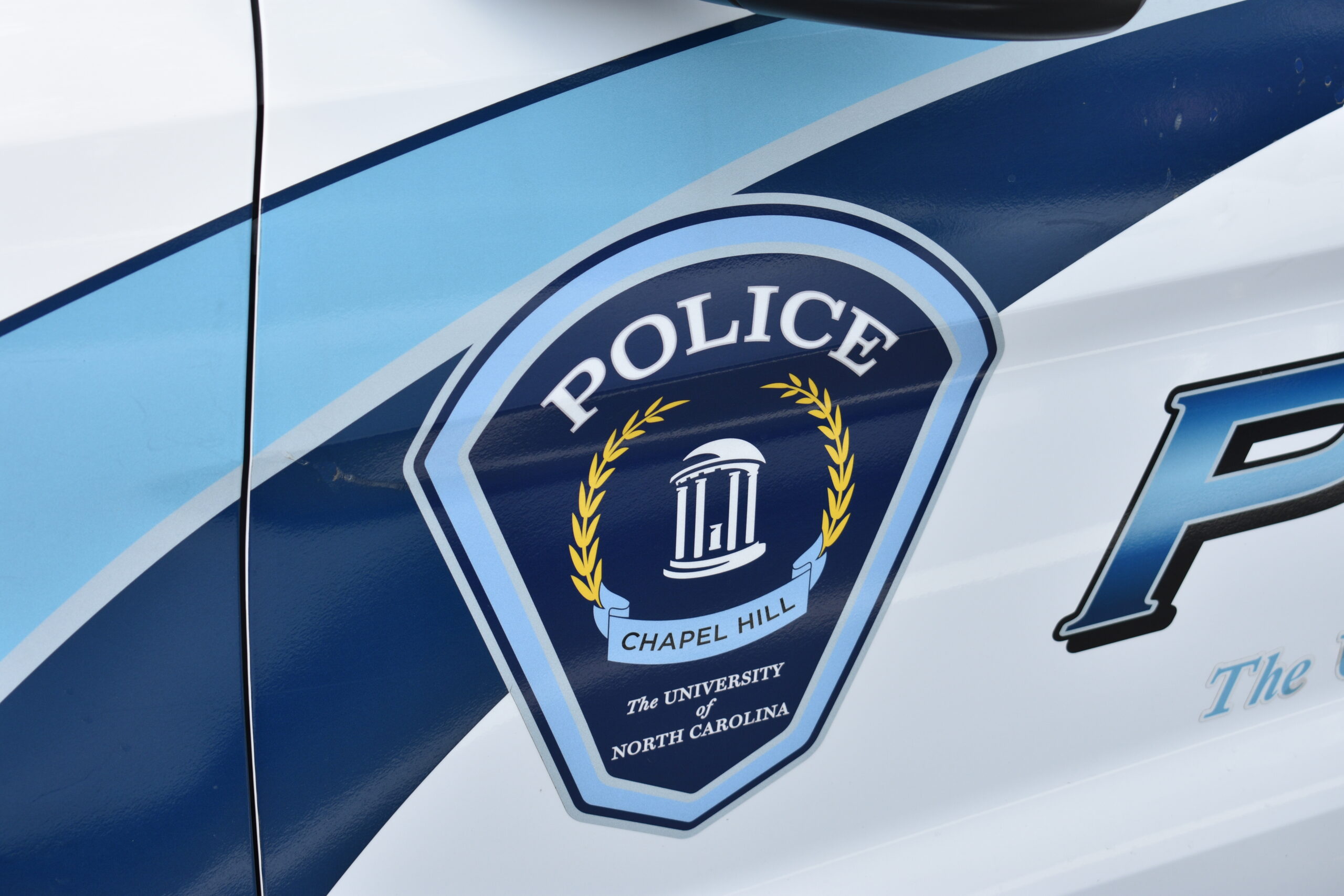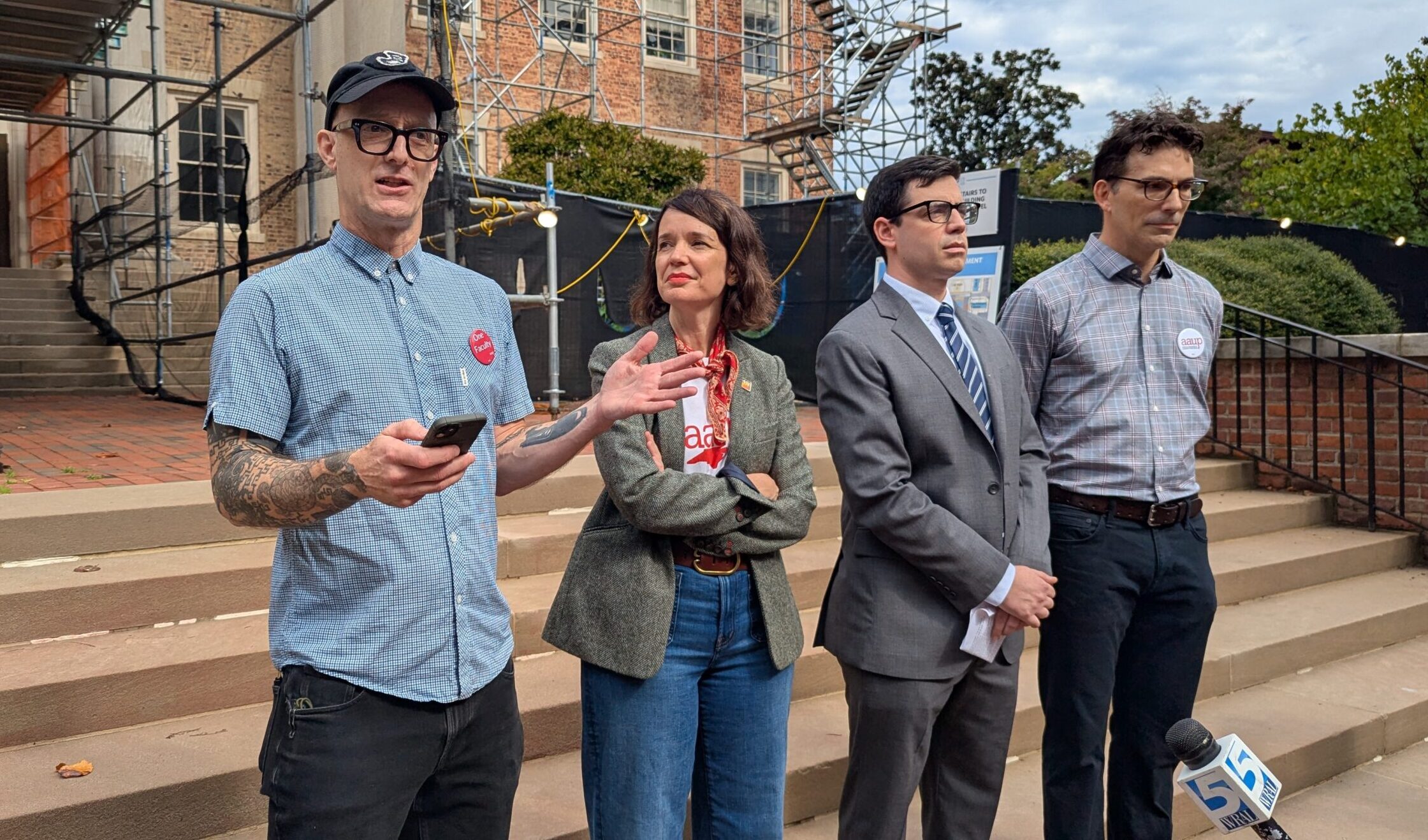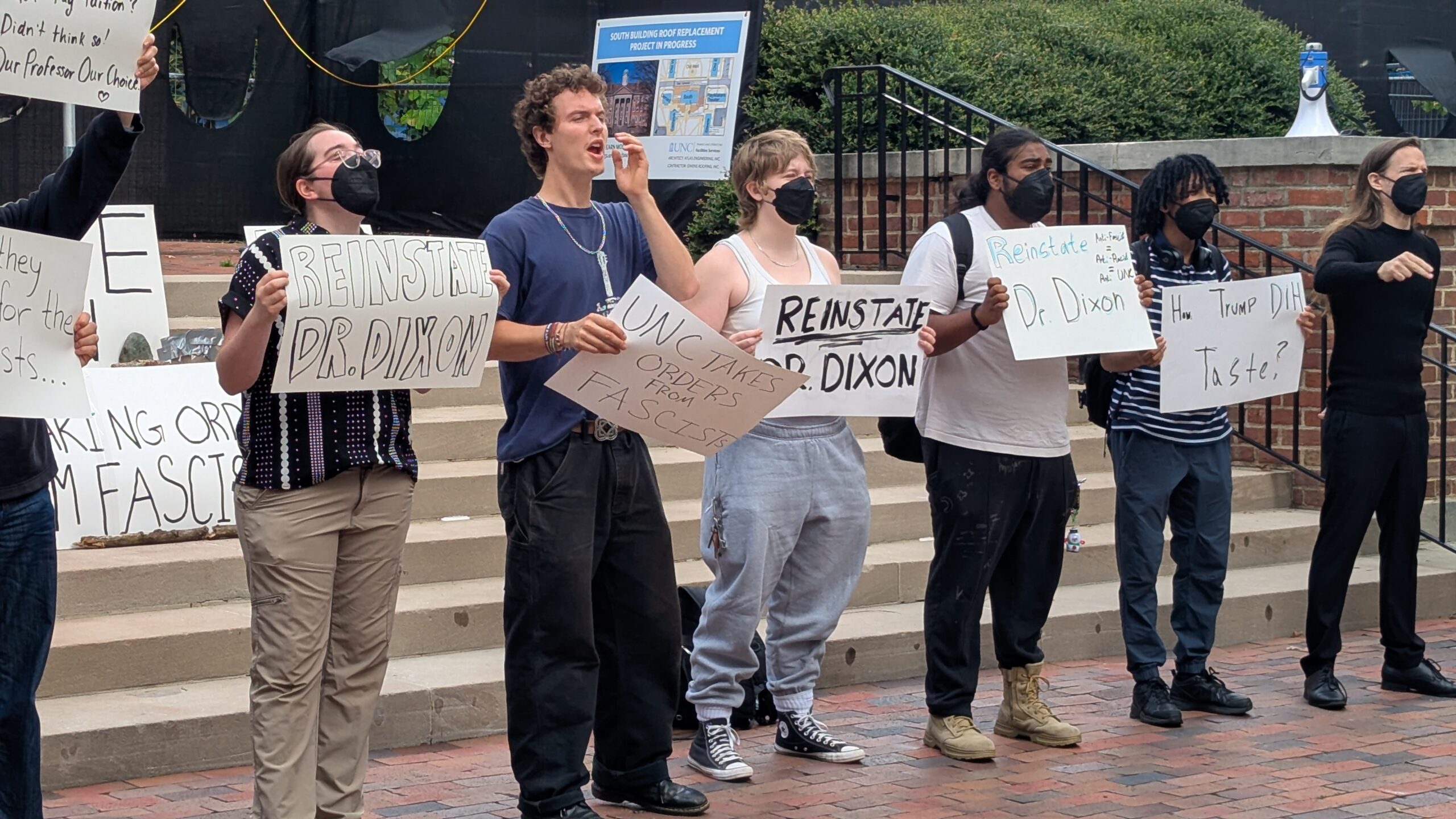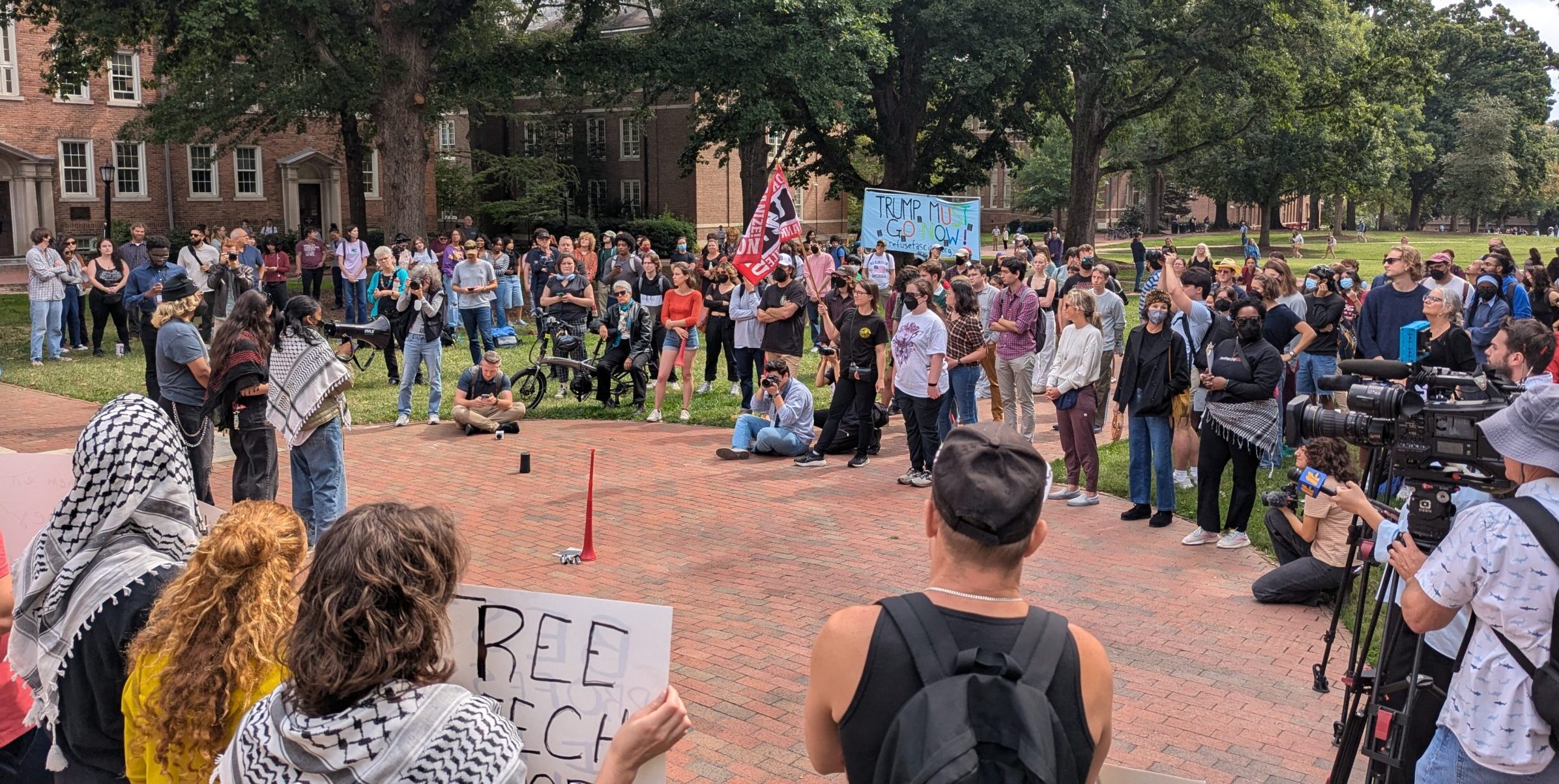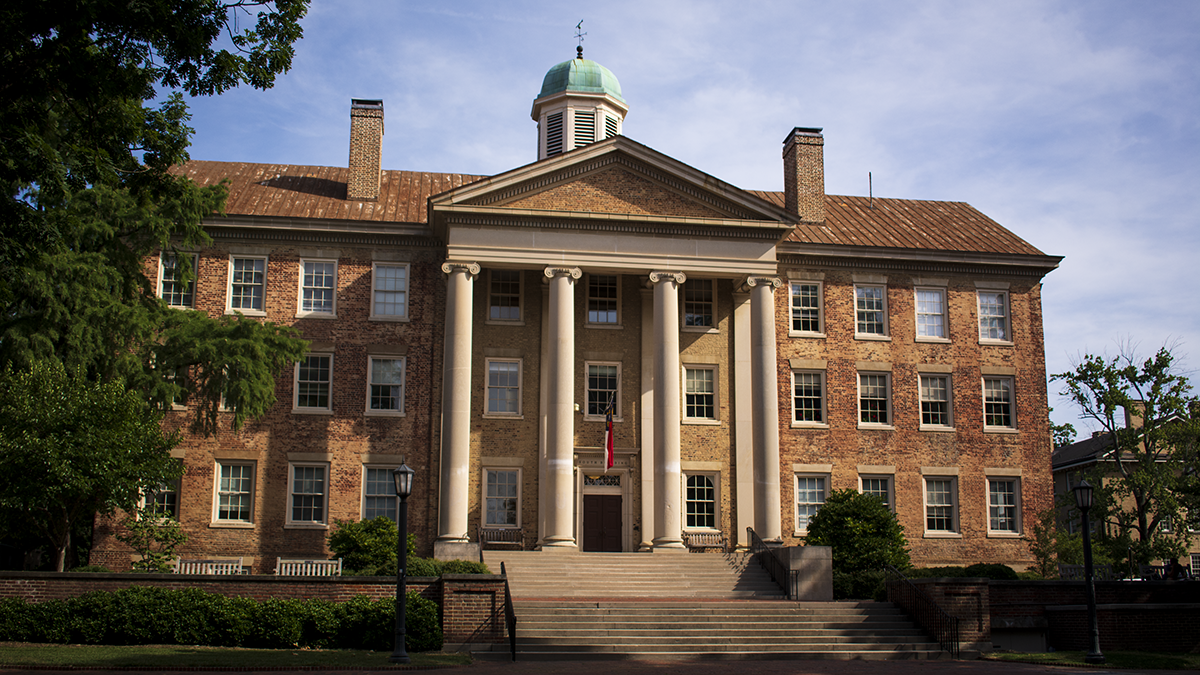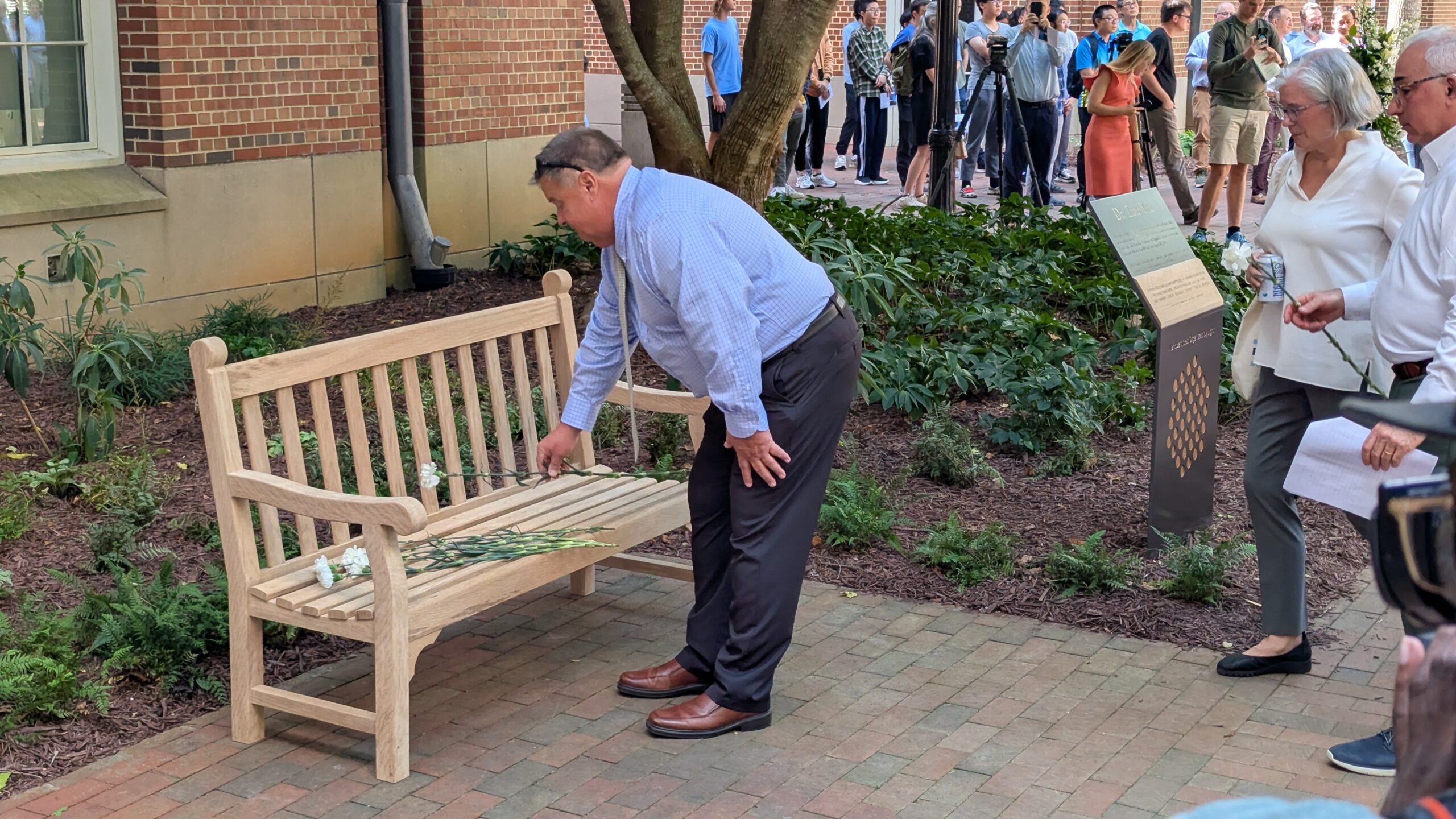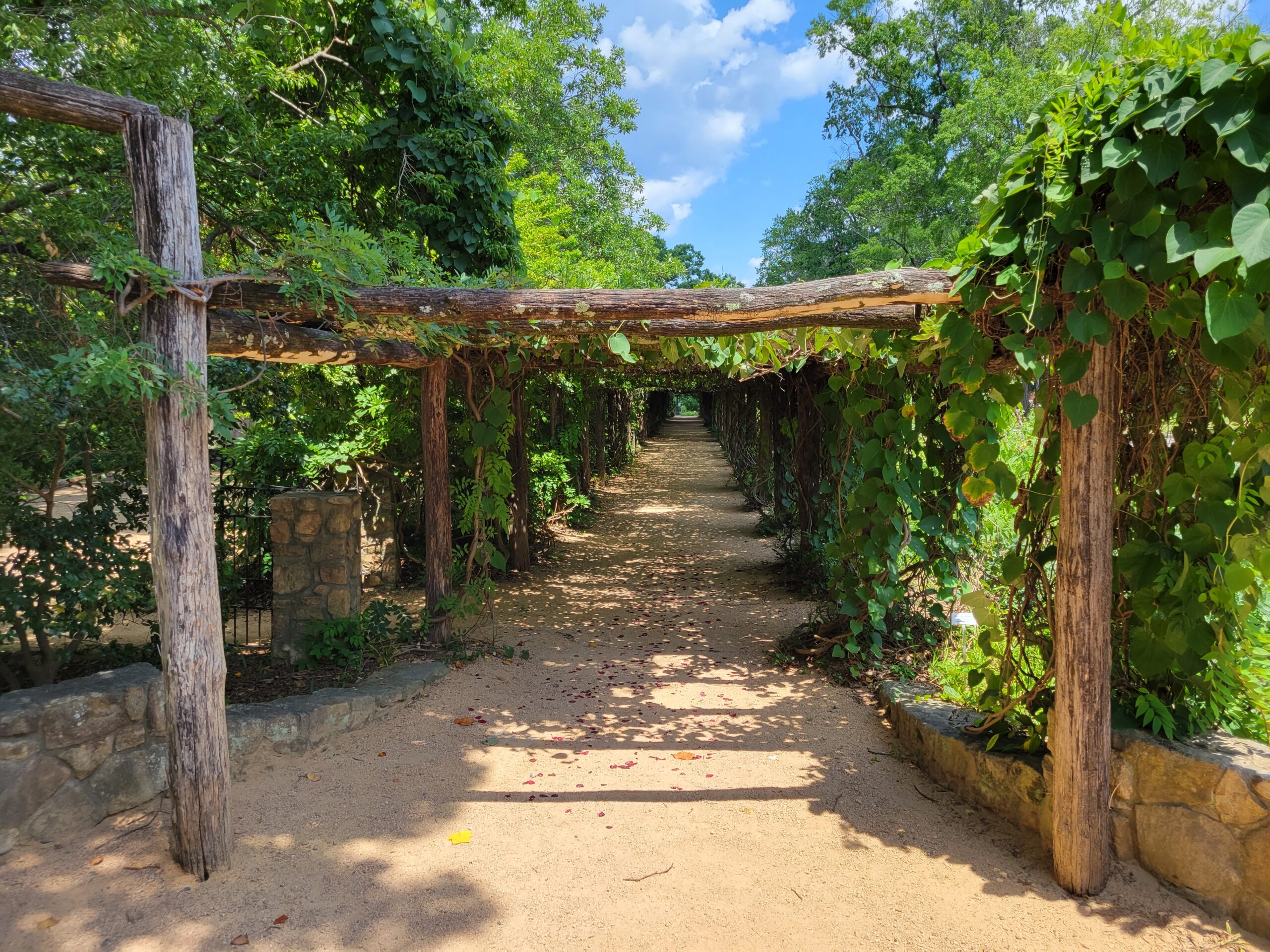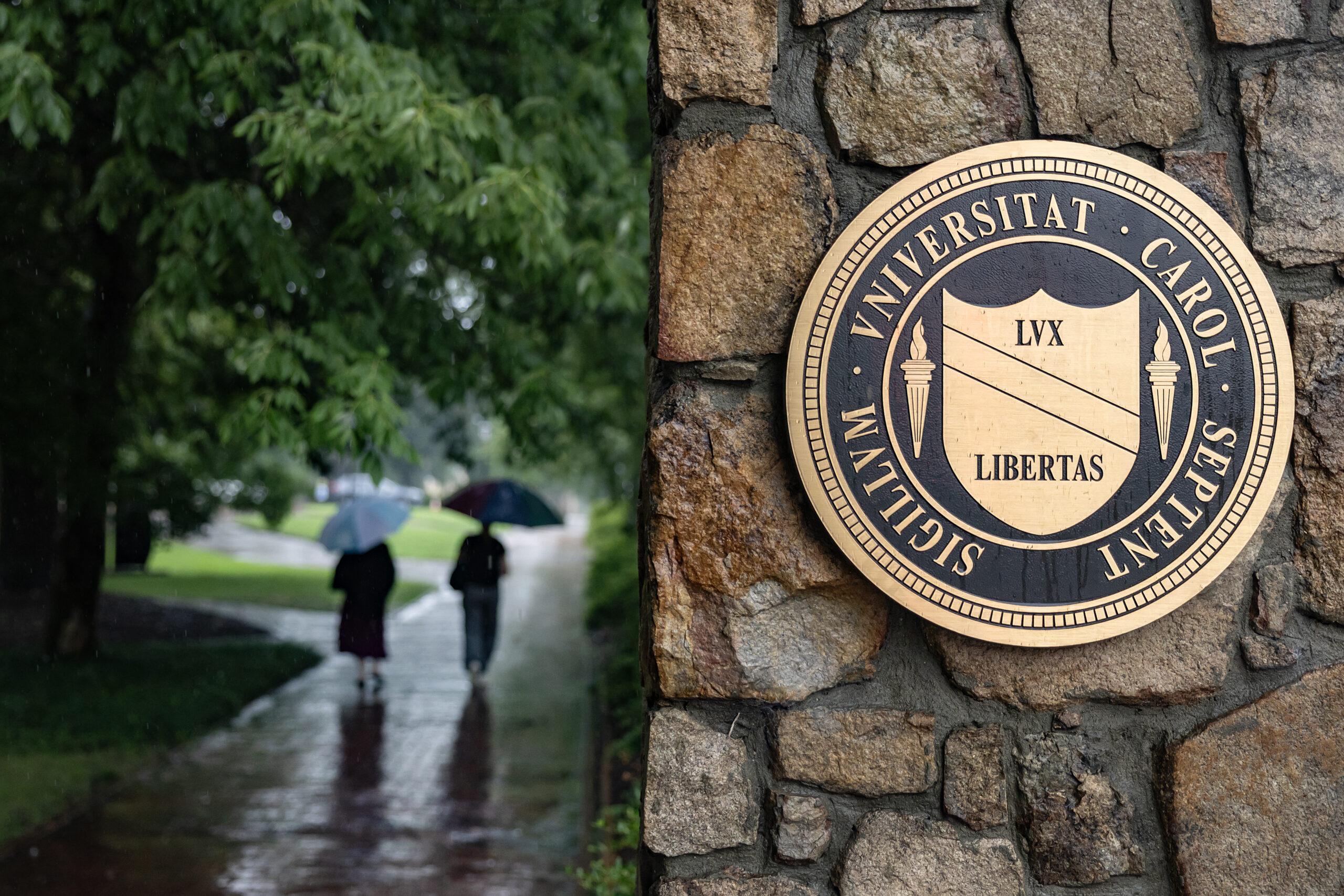This week is Pride Week on the UNC campus, with events all week long to recognize and celebrate Carolina’s LGBTQ community.
Among those events is a theatrical performance called “The Story of Us,” bringing to life the oral histories of more than two dozen LGBTQ alumni — twenty-seven, to be exact — whose experiences date back to the 1950s. UNC’s Process Series is teaming up with the Carolina Pride Alumni Network (CPAN) to present this free show at the Global FedEx Center, Saturday, April 15, at 7 p.m., and Sunday, April 16, at 2 p.m.
Click here for more information on “The Story of Us.”
One of the 27 featured alumni is Mark Kleinschmidt, who served as Chapel Hill’s mayor for six years and now serves as Orange County clerk of superior court. He’s also the one who first coined the phrase “The Story of Us” for the project.
Aaron Keck: What’s it all going to be about?
Mark Kleinschmidt: About five or six years ago, a group of alumni came together and created a queer-based alumni group (CPAN, the Carolina Pride Alumni Network). We have almost a thousand members now, and we would meet together and talk about our experiences at Carolina. It was so interesting to talk about what it was like to be in Chapel Hill, to be a student at UNC and be gay in the 1950s, and how it was different in the ‘60s, and then suddenly the ‘70s come and people are reaching out a little bit more, being a little bit more visible.
And then in the late ‘80s, I arrived. [It was] still a community that was tough to be out in. It was still making a big statement to acknowledge that you were part of the community. And then this revolution has occurred in the last 20, 30 years, where the university actually goes to great lengths to try to create a level of comfort and safety for the community. What a transition, in just a generation and a half! And those stories were just bubbling up — and we were like, “you know, we’ve got to bring these stories to the people.” We needed to tell ‘the story of us.’ And I remember saying that around a table with Shawne Grabs at the university development office — she was instrumental in beginning CPAN — and she said, “That’s it! It’s ‘The Story of Us.’”
Keck: I remember you talking at [Chapel Hill’s] pride march last year, just looking out at this huge crowd of people that had gathered at Peace & Justice Plaza and [reflecting on] what a huge difference it was now versus the late ‘80s, when there were pride marches, but they were very small and the vibe was completely different.
Kleinschmidt: Oh, yeah. I remember going to my first pride march — I didn’t march! I just pretended to have accidentally been on the street when it happened. [There was] just a lived fear, constant fear of being outed. And then what you convince yourself would be the great levels of discrimination that you would face, if anybody knew about you. I mean, when I was an undergrad, I was studying to be a teacher. And at the time, you know, [not only were there] no protections for [LGBTQ] teachers, you just weren’t going to find a job. So I was really just scared about being too visible.
I had friends who did come out in college, to a greater degree — and before I graduated, I mean, the hinges were thrown off the door <laugh> — but I had some friends who came out a little bit before me, and then they would get involved in the community. And I remember one in particular: because she appeared in the newspaper, somebody who didn’t like her wrote to her mother to tell her, and sent the story in, and that was her outing to her family. Nobody ever knew what to expect of their own coming-out experience back then.
Keck: This was the Anita Bryant era too, or just after it, where you had people trying to pass laws against gays and lesbians just having any opportunity to teach at all.
Kleinschmidt: [And] admitting that you expressed your love and affection for somebody of the same gender was a class I felony in North Carolina. And that actually is still on the books. It just isn’t enforceable because of Supreme Court decisions. But that’s what they would say to us: “you’re not going to get hired as a teacher. You’re an admitted felon.” And that’s how members of the legislature responded to our efforts to create laws to protect the LGBTQ community. And you know, whenever that’s the excuse for not giving you just basic human rights, it’s kind of a scary place to be in.
Keck: I don’t want to give too much away from the performance — but now I have to ask for more details on the ‘hinges being thrown off’ when you were at UNC.
Kleinschmidt: Yeah, it was kind of hard to keep them on the door <laugh>. My sophomore year — and I don’t know what part of my story’s actually going to be in the performance, I just know that some piece of my interview’s going to be in there. And I wonder, is it going to be my coming out? [The] walk of shame I did coming home one night, when I was supposed to be out with friends and then I didn’t show up in my dorm — and walking through the hall, and everybody knew where I had been, and it was over. You know, it was like, “okay, here I am…”
But I actually was fortunate enough to live in a community on campus that was a very safe space. There was a living and learning program called UNITAS at the time, and it deliberately sought out people of different life experiences, forced them to live together in a community, to try to engage with difference and to celebrate diversity. So I was grateful that I had this hall. I lived on this hall in Carmichael, with people who were — initially some of them were a little confused, like, “wait, don’t you have a girlfriend?” “Well, not anymore!” <laugh> [But] then being embraced by them — and that safe space I had there, gave me a little more courage to stand up, and be loud, and wear my – there were all kinds of things we would wear. I had a big t-shirt with a pink triangle on it, of course. And I had these little pride rings, which were really popular in the ‘90s, and I wore them proudly and dared people to ask me what they were <laugh>. You know, it was a time of liberation — [and] it was also a time of great anxiety and fear, because I was still trying to get a job as a teacher. And once I did become a teacher in the ‘90s, I kind of had to pull that door closed a little bit.
Keck: Did you ultimately have trouble getting a job as a teacher for that reason?
Kleinschmidt: I didn’t, because I closed the door. And so my professional life, I worked with people — it was the only time in my life where I worked with people who didn’t know all of me. You know? They didn’t know the story of me. And I think this is what this whole project is about. It’s getting these stories out that were kept quiet, kept undercover, and [revealing] what had been hidden for so long, and the lived experiences of people who went to school and taught at the university over the last several decades.
You know, these stories — you can hear many of them online with the Southern Historical Collection. You can hear the full interviews – and you can just hear in them, [when] they retell their experiences from the ‘60s, ‘70s, and earlier, just the great anxiety around being found out. And then the desperate measures that people went to, to find each other. To create a sense of community. And just the great acts of courage that it took to come together, and stand up and provide support for each other. The kind of support that I eventually found in my living and learning program, when I was an undergrad. And I hope that this is revealing to people, particularly to young people today who [live] a different experience [today]. They stand on the shoulders of people who have really suffered, both personally and professionally, over the years.
Keck: [You mentioned] having to go to work and not be able to be open about yourself. [And] people who don’t have to hide or don’t have pressure to hide — they don’t understand just how open they are on a regular basis. And that’s true today. [This] anti-gay backlash: “oh, you’re a teacher, why are you talking about your spouse or your sexuality in class?” Well, listen to other people and see how often they talk about it! People feel very open to talk about themselves. And it just washes over us, we don’t (even) notice it.
Kleinschmidt: You know, I could go down the hall of the school that I taught in — [and] like, Mrs. Jones, we all knew that she’s married to Mr. Jones, and they’ve got three kids and one of them is about to graduate from college. And Mr. Thompson down the hall, he’s been divorced three times and has five kids and doesn’t know how to make his teacher’s salary pay for all the child support. You know, we could tell these stories, because everybody knew those stories — the story of them — but nobody knew or was aware of the story of us. We had to keep it quiet.
Keck: Who are some of the other alumni, whose stories are told?
Kleinschmidt: Well, one of them is — we affectionately call her the Voice of God, Janora McDuffie, who serves on the board of CPAN; she’s a well-respected actress and she was an announcer on a recent Oscars telecast. I geek out totally, whenever we go to board meetings and there’s Janora. She was on Grey’s Anatomy for a couple seasons. Then there are folks that are coming, [who] were the first to organize students and faculty together. Former student body president Hogan Medlin, parts of his story are going to be told and dramatized. And again, I don’t really know for sure what parts. I’m a little nervous — but this is the kind of anxiety that I embrace, as opposed to that kind of anxiety that I lived with as a 19-year-old.
Keck: What’s the actual performance going to entail?
Kleinschmidt: Well, they’ve spent months weaving together what amounts to hundreds of hours of oral histories. And there are a whole host of professionally trained people, several from Playmakers, including Vivienne Benesch — and they’re going to bring our interviews to life. I hope the world comes to see this with me. It’s an odd place to be: who’s going to speak my words? It’s a dissonance that I’m in right now, [but] it’s going to be fun.
Chapelboro.com does not charge subscription fees, and you can directly support our efforts in local journalism here. Want more of what you see on Chapelboro? Let us bring free local news and community information to you by signing up for our biweekly newsletter.

